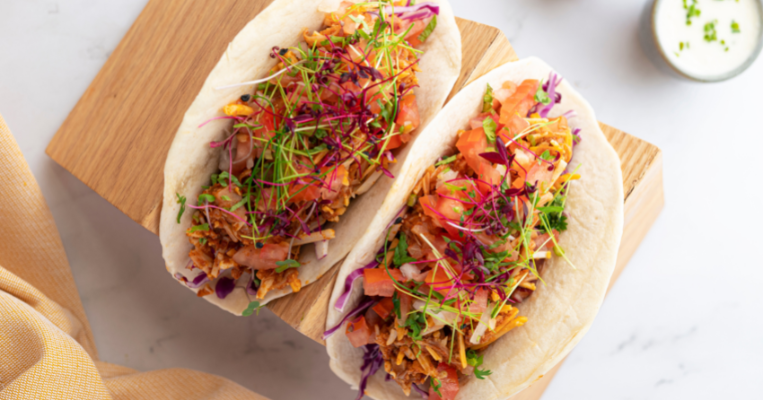
7 December 2022
Balance Your Vegan Diet: Macros Edition

I am forever grateful for my degree, as I find the concept of nutrition comes into almost every conversation I have around wellness, veganism and even spirituality. And, when having those conversations, there is one key topic that frequently comes up – macros.
An important part of any diet, but perhaps even more important for vegans, macros are a valuable tool in maintaining your physical and mental health and reaching your goals. They are something I have spent a lot of time both in and out of my degree researching, and a factor I considered carefully when developing the recipes for my plant-based cloud kitchen, Plant Essence.
In this blog, I’ll be exploring what macros are, why each macro is important and how you can balance yours.
I have a BSC in Food Science and Nutrition from Coventry University. If you’d like to learn more about this qualification, or any others I have, you can find them on my about page.
What Is A Macro?
A macro, which is short for ‘macronutrient’, is one of three categories of nutrients that you eat most often: protein, carbohydrates and fats.
Keeping track of your macros helps you to balance them out in a way that is right for you, your health goals and your activity levels. It helps you to make smarter food choices and reach your goals faster – both mentally and physically!
Here is a quick run-through of the importance of each macro…
Carbohydrates
Carbohydrates get a pretty bad rep, despite being one of the most important food groups we can consume. They are your body’s main source of energy, which is why a “no carb” diet can often leave you feeling tired and sluggish. But there are many other dangers associated with a lack of carbohydrates, including headaches, difficulty concentrating, nausea, constipation, bad breath as well as vitamin and mineral deficiencies.
Carbohydrates provide the body with glucose, which is then converted into energy to support bodily functions and physical activity. They are known to fuel your brain, kidneys, heart muscles and central nervous system as well as aiding digestion, helping you to feel full and keeping your cholesterol levels in check.
There are three main types of carbohydrates: sugar, starch, and fibre. Sugar can be found in fruit, nectars and syrups, as well as some vegetables and germinating grains. Starch can be found in potatoes, bread, cereal products, rice, grains and pasta. Meanwhile, fibre can be found in vegetables like broccoli, whole grains, beans and lentils, popcorn and some fruits, like apples and bananas.
My favourite healthy and vegan-friendly carbohydrate sources are millet, potatoes and rice.

Protein
Protein is well-known for being crucial to building muscle and helping your body to grow and repair itself, but it also has many other important functions, too. Protein helps red blood cells to carry oxygen throughout the body, supports normal digestive function and regulates hormones. It can also curb hunger (particularly those late-night cravings) and boost the metabolism, helping us to maintain a healthy weight.
A common misconception of a vegan diet is that vegans often struggle to get enough protein, but that is rarely the case. Protein can be found in a wide variety of plant-based foods, including seitan, soy beans (including tofu, tempeh, edamame and soy milk), lentils, beans, nutritional yeast, spelt, quinoa, oats, rice, chia seeds, nuts, seeds and even fruits and vegetables! For example, did you know that spinach is equal in terms of protein per calorie to chicken and fish?
My favourite plant-based sources of protein are lentils, chickpeas, edamame beans and tofu.

What Is The Right Macro Balance For A Vegan?
Many people talk about getting the “perfect macro balance,” but truthfully this all depends on many factors, including your personal goals, your activity levels and the type of exercise you do. However, there is a general rule that I often recommend. Ensuring your daily calorie intake is made up of approximately 50% carbohydrates, 30% protein and 20% fats is a great place to start.
Not sure where to start with your macros? Try aiming for 50% carbs, 30% protein and 20% fats.
While not every meal you eat will have the perfect balance of macros, it is important to try to create a balance like the one in my pie chart in the food you eat each day. Some of my favourite recipes with a perfect macro balance are hummus with flax seed crackers, chickpea & lentil curries with rice, and a breakfast burrito with tofu and avocado. That’s why all of these recipes are part of the menu at Plant Essence!
Fats
Because the word “fat” has such negative connotations, we often shy away from fatty foods for fear of gaining unhealthy weight. However, a moderate amount of fat is an essential part of a healthy, balanced diet.
Fat is a source of essential fatty acids, which the body cannot make itself. These acids are vital energy sources for our body. They influence tissue and cell metabolism while affecting how they function and response to natural signals, such as hormones. Fat also helps the body absorb vitamins A, D and E, which can’t be absorbed any other way. They are helpful sources of energy, as they can be easily stored around the body. Plus, fats support cell growth, keep blood pressure under control and protect our organs!
There are four main types of fat: monounsaturated, polyunsaturates, saturated and trans. The first two are ‘healthy’ fats, whilst the latter two are not so healthy.
Healthy (monounsaturated and polyunsaturated) fats can be found in nuts and seeds, olives and avocado, whilst unhealthy (saturated and trans) fats can be found in meat and dairy, palm oil and coconut oil, and, unsurprisingly, in many biscuits, cakes, pies and pastries.
My favourite healthy fats are avocado, coconut oil (in moderation, as it is a saturated fat!) and cashew nuts.


